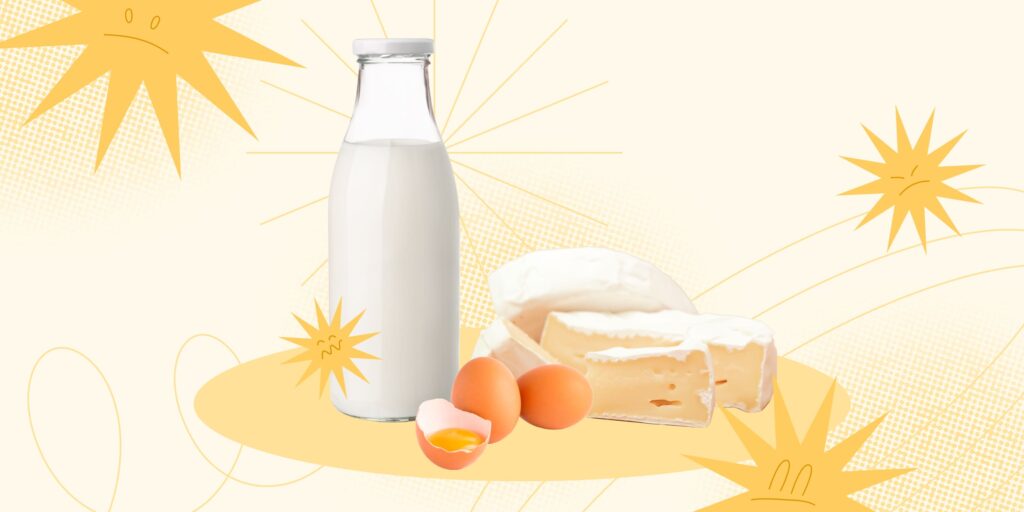If you are pregnant, the amount of coffee should be reduced, and alcohol should be completely eliminated. Everyone knows this.
But there are much more insidious food products. At first glance, they seem innocent and even useful. But in fact, they can harm the mother or unborn baby more than a couple of cups of double espresso three times a day.
Here list popular foods that you should avoid during pregnancy. Or at least think twice before eating.
1. Raw eggs
As well as products containing them: eggnog, homemade mayonnaise, raw dough, poached eggs, fried eggs with raw yolk, tiramisu.
What is the danger
One word is enough: salmonellosis. This acute intestinal infection, fortunately, is not fatal, but is accompanied by severe diarrhea and vomiting, which can cause dehydration. In addition, disseminated infection can lead to premature birth, neonatal complications and fetal death.
What to do
If you can’t give up eggs, make sure they are thoroughly washed and heat-treated. Hard-boiled eggs, omelettes, and baked goods are safe.
2. Raw meat
And also rare steaks (“rare”), uncooked smoked and dried sausages, poorly fried minced meat – for example, in fast food.
What is the danger
Raw meat can be contaminated with parasites. For example, toxoplasma. They are able to penetrate the placental barrier and cause serious disruptions in the development of the unborn baby.
What to do
It’s easy to rid meat of parasites – treat it properly. If we are talking about dried or smoked products, freezing them for four days will help reduce the risk.
3. Raw fish
You should be especially careful with river and wild ocean fish, shellfish (oysters, mussels), dried and smoked fish of all types and sushi.
What is the danger
The range of troubles that you can get from eating a roll or dried perch is wide:
- like meat, fish can be infected with parasites;
- pathogenic bacteria are also found in the pulp – for example, listeria or botulinum bacteria (usually in canned foods), which cause deadly (for mother as well) botulism;
- river fish can be caught in chemically polluted waters – and all the toxic substances will reach both mother and baby;
- Ocean fish accumulate mercury. Especially dangerous in this regard, shark, swordfish, king mackerel and tilefish, bigeye tuna. Exposure to mercury can cause severe damage to the fetus’s central nervous system, as well as intellectual, motor and mental impairments.
What to do
There is only heat-treated fish with low mercury content.
4. Liver
As well as liver pate and sausage, fish oil from the liver cod.
What is the danger
Too much vitamin A. Too much of it can bring to congenital malformations of the fetus.
What to do
Do not overuse liver products. During pregnancy, it is also important to discontinue multivitamin complexes that contain vitamin A, since it already enters the body with food.
5. Soft cheeses
In the area of special attention:
- soft cheeses with white mold – brie and camembert;
- blue cheeses – Gorgonzola, Roquefort, Danish blue.
What is the danger
Soft cheeses are dangerous due to the possible presence of bacteria that cause the disease listeriosis. Such infection can lead to premature birth, fetal death, and neonatal complications (sepsis, meningitis).
What to do
The ideal option is to switch to hard cheese (cheddar, Parmesan, Stilton and others): it is safe. Soft cheeses can also be consumed, but only if they are made from pasteurized milk. These are mozzarella, feta, ricotta, cream cheeses, halloumi, processed cheeses.
6. Unpasteurized milk
As well as yogurt, ice cream and cheeses.
What is the danger
All at the same high risk of bacteria. Unpasteurized milk is a product that has not undergone heat treatment. There is a danger of possible infection with brucellosis, which can lead to premature birth, spontaneous miscarriage, and fetal death.
What to do
Try to drink only pasteurized milk. If for some reason only raw is available, be sure to boil it before eating.
7. Caffeinated Products
This includes not only coffee, but also green tea, chocolate, cola, energy drinks, and some cold and flu medications.
What is the danger
An excess of this substance can lead to to spontaneous miscarriage, fetal malformations and growth retardation.
What to do
You don’t have to completely give up caffeine – just don’t consume more than 200 mg per day. To avoid crossing the line, rely on approximate values:
- 1 cup of instant coffee – 100 mg of caffeine;
- 1 cup of espresso – 140 mg;
- 1 cup of tea – 75 mg;
- 1 can of cola (330 ml) – 40 mg;
- 1 can of energy drink (250 ml) – 80 mg;
- 50 g dark chocolate – up to 25 mg;
- 50 g of milk chocolate – up to 10 mg.
We emphasize once again: these are approximate figures. But they can be used for calculations. For example, if you drank a cup of espresso in the morning and a can of cola in the middle of the day, you received almost 200 mg of caffeine.
8. Poorly washed vegetables and fruits
And also berries that grow close to the soil – the same strawberries or currants on the lower branches of the bush. Freshly squeezed juices are also questionable if you don’t know how thoroughly you washed the ingredients before preparing them.
What is the danger
Bacteria that cause toxoplasmosis, botulism and listeriosis also live in the soil. There is a risk that an apple picked up from the ground or a poorly washed carrot will carry them.
What to do
You cannot give up vegetables and fruits during pregnancy: it is part of a healthy, balanced diet. But keeping them clean is a must. Not only the health of the mother herself, but, possibly, the life of the unborn baby depends on this.
Read also 🤰👶👩⚕️
